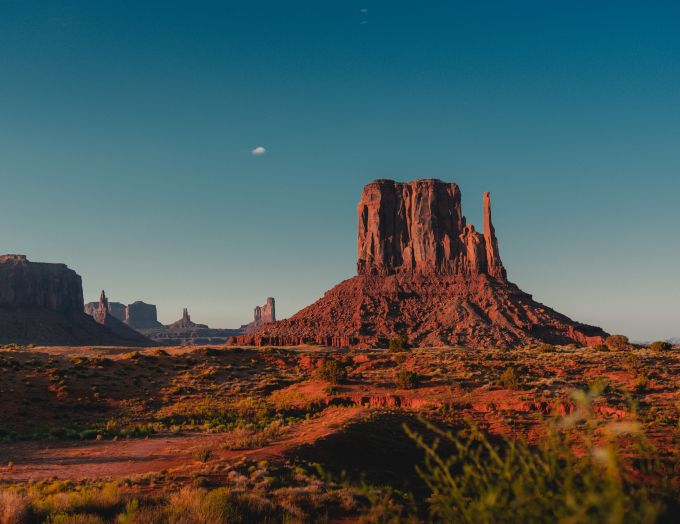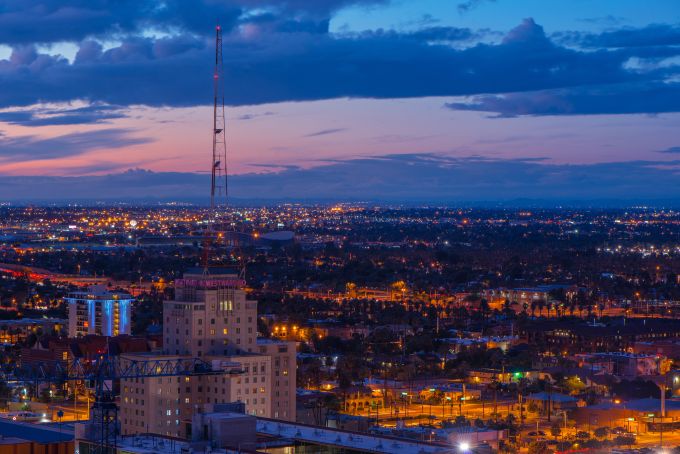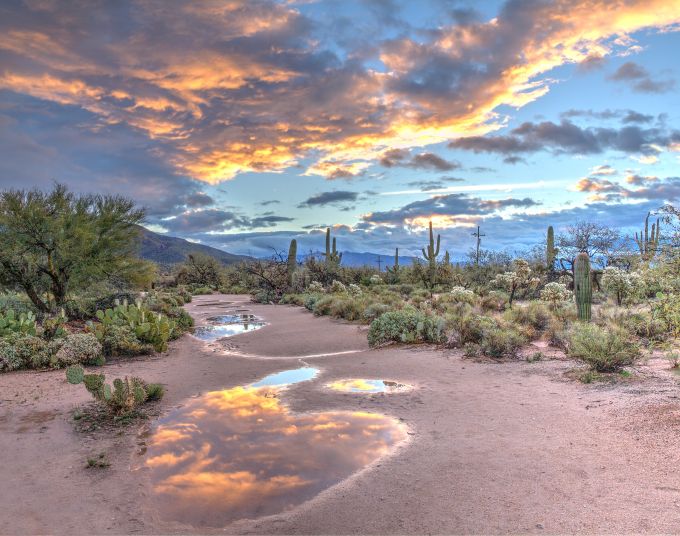Delta 8 has surged in popularity nationwide ever since its federal legalization in 2018. Some states, however, have implemented measures to heavily restrict or ban the compound. But is the Copper State one of these states, or is delta 8 legal in Arizona?
Is Delta 8 Legal in Arizona?
Before exploring Arizona’s hemp laws, let’s review the Farm Bill, or the piece of federal legislation that legalized hemp across the country. Also known as the Agriculture Improvement Act, the Farm Bill was passed in 2018 under Donald Trump. It legalized hemp and all of its compounds and derivatives, thus rendering cannabinoids like delta 8 federally legal (as long as they are derived from hemp).
The Farm Bill also created a legal distinction between hemp and marijuana, despite their scientific similarities. Under federal law, hemp refers to cannabis plants containing 0.3% THC or less on a dry weight basis, while marijuana means any cannabis plant with THC contents over 0.3%.
While the Farm Bill legalized hemp and the compounds that come from it, marijuana remains a schedule I substance and thus strictly illegal at the federal level. That said, the Biden administration recently put out a statement expressing its plan to revisit the government’s stance on marijuana. These steps include pardoning all federal offenses for simple possession of marijuana, urging states to do the same on their level, and initiating the process to reconsider marijuana’s classification in Schedule I of the Controlled Substances Act.
Here's to hoping for a near future with more comprehensive and compassionate marijuana laws, but for now, hemp-derived cannabinoids like delta 8 remain the only federally legal way for US citizens to use cannabis recreationally.
Now that we understand federal law surrounding hemp a bit better, let’s go back to the Copper State. Is Delta 8 legal in Arizona?

Delta 8 in Arizona
Although hemp-derived compounds like delta 8 are federally legal, federal law does not trump state law. Some states have rejected the federal government’s stance on the issue and created laws of their own prohibiting the use of cannabinoids like delta 8—as is their constitutional right. Unfortunately, Arizona is one of these states.
After the federal government passed the Agriculture Improvement Act, effectively legalizing hemp carrying no more than 0.3% THC and all cannabinoids, terpenes, derivatives, isomers, and salts made from said hemp, it also removed hemp from its list of schedule I substances.
Arizona followed suit to an extent. The state established a hemp pilot program under Senate Bill 1098, which provided a regulatory framework for hemp growers and cultivators, but didn’t specifically mention the legalization of hemp-derived compounds like delta 8.
Although there was no mention of these compounds, Arizona’s Controlled Substances Act does classify all tetrahydrocannabinols derivatives, isomers, and preparations as controlled substances, according to 36-2501 from the Arizona State Legislature. This means that the state of Arizona sees delta 8 as a prohibited substance with no medicinal value that is open to abuse.
In March of 2022, Senate Bill 1715 passed in the Arizona Senate. The law seeks to make the manufacturing and sales of delta 8 a felony. Backed by the Arizona Dispensaries Association, the bill would ban “hemp-derived manufactured impairing cannabinoids,” such as delta 8.
According to lawmakers and supporters, the bill attempts to ban dangerous synthetic cannabinoids and keep children away from psychoactive products. Although delta 8 is found naturally in hemp, it only exists in small amounts, so manufacturers derive delta 8 from hemp-based CBD in lab environments.
While some view the banning of hemp-derived delta 8 as a measure to keep consumers—and children—safe from an unregulated psychoactive product, others see it as an obstruction to competition in Arizona’s cannabis industry.
Shipping Delta 8 Products to & from Arizona
Due to delta 8’s legal status in Arizona, it is unlawful to ship delta 8 to or from the state. This means that no reputable and trustworthy source will ship delta 8 products to the Grand Canyon State.
In states where compounds like delta 8 are legal, however, many consumers opt for online retailers instead of smoke shops or gas stations for many reasons. Firstly, online stores offer much more transparency than physical stores; they offer full ingredient lists and third-party lab testing for individual products, meaning that shoppers can purchase these products knowing that they are well-made, safe, and of high quality.
Online stores also have a more reliable reputation: you can do some internet research or explore their sites to find information about their hemp sources, production processes, customer reviews, and more. They also count on professional customer service representatives available to help you with any questions, comments, or concerns.
Lastly, online retailers have much more variety when it comes to products. Whether you want delta 8 or any other compound, online stores have thousands of products for you to browse, meaning that instead of settling for whatever your local smoke shop has in stock, you can find products that fit your wants and needs exactly.

Finding Delta 8 in Arizona is Difficult Due to Heavy Regulation
You can’t (and shouldn’t) purchase delta 8 products in the state of Arizona. There are, however, some reports of stores ignoring state laws and stocking delta 8 products. We don’t recommend you buy delta 8 from these sellers. If they ignore state law, what makes you think they aren’t also ignoring safety and quality measures when manufacturing these products?
Delta 8 is Illegal in Arizona, But Are Other Forms of Cannabis?
Although delta 8 is illegal in Arizona, not all cannabis is forbidden in the Copper State. As a matter of fact, both medical and recreational marijuana are legal in the state. We’ll break down what Arizona’s medical laws mean a little later, but recreational marijuana was legalized in 2020 following the passage of Proposition 207, also known as the Smart and Safe Arizona Act.
The voter-approved initiative allows adults over the age of 21 to possess, purchase, transport, and process 1 ounce or less of marijuana or 5 grams or less of marijuana concentrate. The Arizona Department of Health Services is responsible for licensing and regulating marijuana, marijuana retail sales, marijuana growth, and testing facilities in the state.
Arizona’s DUI laws are not changed by the Smart and Safe Arizona Act. Driving while impaired by marijuana remains a crime. That said, in order to be convicted of a DUI for having THC in your body, the prosecution will need to prove that you were driving while actually impaired. Simply having a metabolite, such as carboxy-THC, in your blood is not enough to convict you of a DUI. Be sure not to drive, operate a boat, or fly an aircraft if you’re under the influence of THC!
Additionally, the law does not permit the use of marijuana in a public or open space, so don’t do it in public, near a school, or while operating a vehicle. Much like with alcohol, employers can still prohibit marijuana use while working, the law does not limit an employer’s right to maintain a drug-and-alcohol-free place of employment.
Another important component of the proposition is that police can no longer perform a warrantless search if they smell marijuana. It protects your 4th Amendment rights to be free from police searches without a warrant. “The odor of marijuana or burnt marijuana does not itself constitute reasonable articulable suspicion of a crime,” the law states.
Delta 8 vs. Delta 9 in Arizona
Although delta 8 is strictly illegal in the state of Arizona, hemp-derived delta 9 is, surprisingly, legal. Those 21 and up can purchase hemp-derived delta 9 products as long as they contain a concentration of 0.3% THC or less.
Since recreational marijuana is legal, however, delta 9 derived from marijuana can be found at dispensaries So, delta 9 made from hemp and delta 9 made from marijuana are both legal in the Copper State, but if you buy hemp-derived delta 9, it cannot contain more than 0.3% THC. Additionally, because recreational marijuana is legal in the state, you may also be able to find legal marijuana-derived delta 8, but legislation and availability on that remain unclear.
Arizona Cannabis Market Grows with Medical Marijuana (But Without Delta 8)
Arizona’s cannabis market is pretty extensive; not only does it envelop a booming recreational cannabis economy, but it also includes an increasingly popular medical marijuana scene. As previously mentioned, however, the state’s cannabis market is pretty hostile towards outsiders like delta 8.
Marijuana industry thriving in Arizona
Arizona Medical Cannabis Laws
Arizona’s medical cannabis program dates back to 2010, when Proposition 203, also known as the Arizona Medical Marijuana Act, was passed. It allowed licensed physicians to legally prescribe marijuana to patients and allowed patients to purchase up to 2.5 ounces of marijuana every two weeks.
Some chaos ensued. For years, Arizonans wrestled with the question of whether hashish and cannabis extracts qualified as medical marijuana. In March of 2013, a registered marijuana patient named Rodney Jones was arrested for possessing 1.4 grams of hashish and a glass jar, which the state of Arizona qualified as paraphernalia.
In 2016, the Arizona Court of Appeals sentenced Jones to two and a half years in prison, arguing that hashish and other cannabis extracts were not covered by the Arizona Medical Marijuana Act. During Jones’s trial, the state “withheld from the grand jury that he was a patient, that he presented his AMMA card to police, and that he advised them he acquired the extract at a dispensary,” according to court documents.
Three years later, the Arizona Supreme Court overruled the Arizona Court of Appeals and officially determined that hash and cannabis extracts are legal under the Arizona Medical Marijuana Act.
Subsequently, the high court discarded Jones’s conviction, but he had already served prison time for the absurd, and frankly unfair, charge.
In order to qualify for medical marijuana in the Copper State, a patient must have one of the following conditions:
- Agitation of Alzheimer’s disease
- Amyotrophic Lateral Sclerosis (ALS)
- Any chronic or debilitating medical condition or disease of the treatment for one that causes cachexia or wasting syndrome
- Cancer
- Chronic pain (i.e., migraines or arthritis)
- Chron’s disease
- Glaucoma
- HIV/AIDS
- Hepatitis C
- Post-traumatic stress disorder (PTSD)
- Severe nausea
- Severe or persistent muscle spasms, such as those associated with multiple sclerosis
- Seizures, including from epilepsy
To acquire a medical marijuana card in Arizona, you must consult a doctor who can write you a recommendation. Keep in mind, however, that not all doctors are comfortable recommending cannabis to their patients, so it can be helpful to request a copy of your medical records before asking your primary care physician for a recommendation. If they decline, you can easily seek another doctor.
To fill out an application on the Arizona Department of Health Services website, you’ll need a few things:
- An Arizona photo ID (issued after 1996)
- Passport-type photo (2x2 inches)
- To pay $150 application fee ($75 if you benefit from SNAP)
Additionally, a doctor may charge anywhere between $150 and $300 for your appointment.
After the ADHS receives your application, it can take up to two weeks to process, and then potentially up to 10 more days for you to receive your card via mail. The card expires after two years.
Arizona also permits minors to become medical marijuana patients, but they must first designate an adult as their care giver as well as acquire letters of recommendation from two different doctors. That said, the state has very limited medical reciprocity, meaning that while the state recognizes out-of-state patients, they cannot actually buy marijuana in Arizona.
Arizona also allows adults to grow six plants at home. Medical patients can grow up to 12 plants at home, but only if they live more than 25 miles away from the nearest dispensary.
Arizona Medical Cannabis vs. Delta 8
Although Arizona has pretty extensive medical and recreational cannabis, delta 8 remains illegal in the state. In states with medical cannabis laws but illegal recreational marijuana, delta 8 serves as an alternative to medical marijuana.
Because delta 8 is just a milder analog of delta 9—the main psychoactive compound in marijuana—it can provide the same effects to a lesser extent. With recreational cannabis on the table, however, those who don’t apply for medical cannabis cards in Arizona can still reap the benefits of marijuana safely and legally.

Are Other Hemp-Derived Cannabinoids Legal in Arizona?
Delta 8 may be one of hemp’s most popular compounds, but the plant contains many other cannabinoids containing a plethora of properties and benefits ranging from energy to relaxation.
You may already know delta 8, but its younger cousin, delta 10, is also a beneficial cannabinoid. Instead of relaxing you like delta 8, it provides bursts of energy, focus, and creativity. That said, delta 10 is among the mildest cannabinoids discovered to date, even milder than delta 8.
Another popular cannabinoid is HHC, whose potency ranges somewhere between delta 8 and delta 9. HHC has many of the same properties as delta 8 with a stronger kick; it provides deep waves of euphoria that’ll get you relaxed in no time.
But are these legal in the state of Arizona? Unfortunately, no. These cannabinoids are illegal in the state of Arizona, just like delta 8. The only hemp-derived cannabinoid legal in the Grand Canyon State is delta 9, and only when it contains THC levels of 0.3% or less.
Is Delta 8 Legal in Arizona: Final Thoughts
So, is delta 8 legal in Arizona? Sadly, it is not. While the compound is likely to stay illegal in the state for the foreseeable future, the state does have medical and recreational cannabis available for its residents.
In states where delta 8 is legal, it’s always best to buy the compound online for reasons of transparency, variety, and comfort. Even though delta 8 is not legal in the Copper State, Arizonans can still benefit from c











